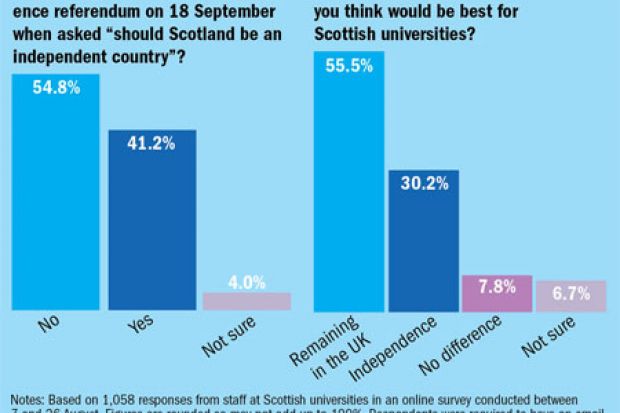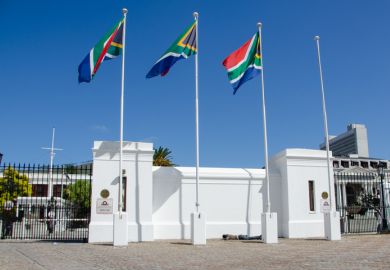The majority of staff at Scottish universities are set to vote “no” in next week’s referendum on independence, and think that remaining in the UK would be better for the country’s universities, according to an exclusive survey by Times Higher Education.
But the survey, which was conducted last month and attracted more than 1,000 responses from academics and administrators, also reveals that academic staff are deeply split by discipline over how they will vote on 18 September (see box, “Science v arts”).
It shows that the “no” vote has a 13.6 percentage point lead over “yes”. This is similar to many polls over the past few months of the general population, although the final result was thrown into doubt this week by a YouGov poll giving the “yes” campaign a narrow lead.
James Naismith, Bishop Wardlaw professor of chemical biology at the University of St Andrews and a member of the pro-union Academics Together, said he believed that opinion on campus against independence had actually hardened, despite growing support for it elsewhere. “The majority of academics discern that, even under the most optimistic scenarios, independence will harm universities,” he said.
But Murray Pittock, Bradley professor of English literature at the University of Glasgow and a leader of the pro-independence group Academics for Yes, argued that THE’s survey lead for “no” was not as large as would be expected for a group largely drawn from the top social classes who, as polls have shown, are more likely to be pro-union.
He also claimed that opinion on the ground at universities was swinging towards the “yes” campaign, although he accepted that majority support for independence at Glasgow meant that “it is not really easy to say if this is reflected” elsewhere.
Opinion against independence appears to grow stronger when respondents are asked what outcome would be better for Scottish universities, rather than how they would vote. More than 55 per cent of respondents said that remaining in the UK would be the best outcome, compared with 30.2 per cent who said independence would be better. The rest either thought the result would not make any difference, or were not sure.
Although the majority of “yes” voters thought independence would be the best outcome, a quarter thought it would not make any difference to Scottish universities, or were not sure. A handful even said that universities would be better off in the UK.
By contrast, “no” voters were more convinced (96 per cent) that remaining in the UK would be the best option for Scotland’s institutions.
Fears about losing access to UK-wide sources of research funding loomed large in responses from those planning to vote “no”.
Julian Blow, professor of chromosome maintenance at the University of Dundee, wrote that “Scotland wins a far greater share of research council funding than their 8.4 per cent of the UK population” and other sources such as the Wellcome Trust could cut the amount of grants they award.
“This suggests that an independent Scottish government would have to increase its spend on research grants by 25 to 50 per cent just to maintain current levels,” he said.
But many “yes” voters want independence to escape what they see as an undesirable, market-driven higher education culture emanating from England.
Murdo Macdonald, professor in the history of Scottish art at Dundee, wrote that the “overriding reason” for voting “yes” was to “resist the American-style marketisation of higher education driven from south of the border”. “It is ironic that Scotland is now the remaining representative of the post-war British consensus with the respect to the importance of free education,” he said.
Additional reporting by Martha Elwell and Jack Grove
No to independence
“It seems to me folly to try to break up one of, if not the, most successful multinational and multi-ethnic states. I…fear an outflow of academic talent from Scotland as we lose vital sources of research funding and have to impose fees on Scottish and English young people alike”
Andrew Williams
University of St Andrews
School of International Relations
“I believe independence will make our world narrower, smaller and a harder place for all of us to find work and flourish”
An administrator at Robert Gordon University
“We rely on UK charitable donations to carry out our research. We have been given no idea of how an independent Scotland would maintain this level of funding as most of the current funding would be lost if we leave the UK”
Sharon Mudie
University of Dundee
College of Life Sciences
Yes to independence
“With the introduction of huge tuition fees in England, and the increasing privatisation of university services across the UK, I think the only way we can protect free higher education in Scotland is with an independent Scottish government”
Tara Thomson
University of Edinburgh
School of Literatures, Languages and Cultures
“The scare stories that research funding would collapse in an independent Scotland simply don’t wash with me: all my academic life I’ve worked on the basis that good-quality research proposals attract funding”
Sean Semple
University of Aberdeen
Centre for Sustainable Development
“The attitude towards education in Scotland is unique and very positive. I think that with independence this is more likely to be consolidated”
Chris Seenan
Glasgow Caledonian University
School of Health and Life Sciences

Science v arts: subject-specific results
Scottish academics are starkly divided by discipline when it comes to the referendum, with those in science far more likely to vote “no” than those in the arts and humanities.
Susan Shaw, former vice-principal of the University of Strathclyde, said that scientists and engineers had greater need of outside grants to fund their research than those in the humanities in order to pay for expensive labs and equipment, and were therefore more nervous about losing access to UK-wide research councils.
Murray Pittock, Bradley professor of English literature at the University of Glasgow, suggested that the content of academic work could also lead to different ways of thinking about the referendum.
“Arts, humanities and social science [academics] are people whose own work leads them to be very conscious of location. All these people work on culture and society. That’s very important in what’s driving ‘yes’,” he said.
Although humanities and social science research was often conducted internationally, “it doesn’t quite have the same borderless sense as science”, he suggested.
Of the academics sampled, 55 per cent were from a STEM or clinical discipline.

Regional divide: university results
A breakdown of the survey results reveals that some universities are hotbeds of pro-independence sentiment, whereas others are staunchly pro-union.
In some cases, the differences in opinion between universities might be explained by academic respondents’ disciplines, which are correlated with how academics will vote (see box, “Science v arts”).
Three-quarters of academic respondents from the University of Edinburgh – one of the institutions least convinced about independence – were from science, technology, engineering and mathematics (STEM) or clinical disciplines, which are more likely to lean towards voting “no”.
Almost two-thirds of respondents from the University of Glasgow, the institution that is most pro-independence, came from arts, humanities, social sciences and modern foreign languages subjects, which correlate with a stronger vote for “yes”.
The vast majority of University of Dundee scholars were from STEM and clinical disciplines, which may help explain why the institution ranks as the most pro-union of all the listed Scottish universities.
But other results are harder to explain using a breakdown of academic subjects. More than eight in 10 academic respondents from the University of St Andrews worked in arts, humanities, social sciences and modern languages, but the university was one of the most hostile towards independence.
And at the University of Aberdeen, staff were more likely to vote “yes” than average despite the proportion of STEM or clinical respondents being in line with the average.
Register to continue
Why register?
- Registration is free and only takes a moment
- Once registered, you can read 3 articles a month
- Sign up for our newsletter
Subscribe
Or subscribe for unlimited access to:
- Unlimited access to news, views, insights & reviews
- Digital editions
- Digital access to THE’s university and college rankings analysis
Already registered or a current subscriber? Login





